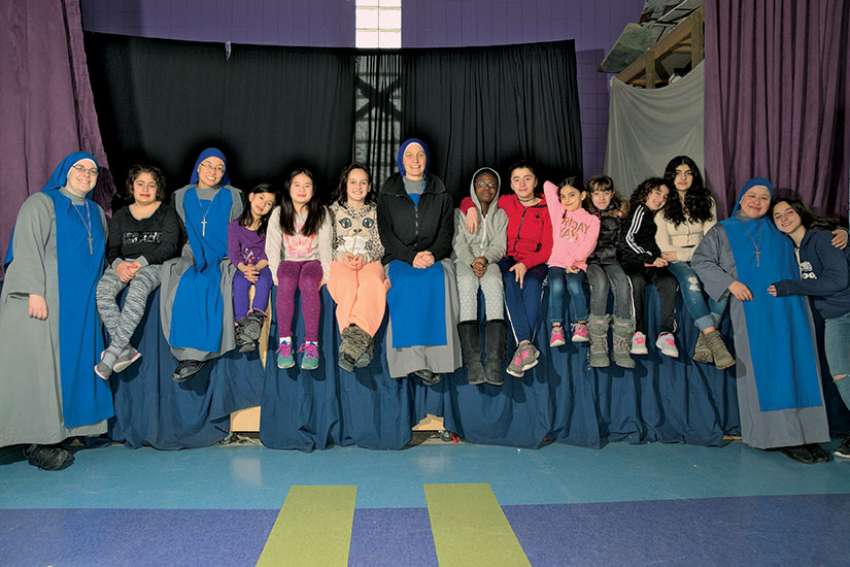“We are kind of second mothers to them,” said local Mother Superior Maria del sol Del Castillo of the Religious Family of the Incarnate Word, which works in the parish. “Many of them, they don’t really have a family, a normal family. They don’t get a chance to see a normal family.”
Many of the families are headed by single-parent refugees juggling two or more low-paying jobs.
“We have a big percentage of the population here from Iraq and Syria as refugees,” she said. “Then we have children from very different countries, most them are born already here, but the parents are from Kenya, Asian countries ... and Hispanic places. It is hard to reach the parents because they work most of the time.”
So Del Castillo, along with four other sisters and two priests of the same order, have stepped in to support these vulnerable children. The “religious family of consecrated men and woman,” as Del Castillo described them, do this by offering those in need daily programming, supported by ShareLife.
The program has been ongoing since 2010 and this year, for the first time, it is receiving financial help from ShareLife, the annual campaign of the Archdiocese of Toronto. The first ShareLife weekend collection in parishes is April 1-2.
“Because we are a religious community ... we always are looking for help,” Del Castillo said. “Before we started receiving this help the Church was providing for everything by the collection so we didn’t have much.”
Piano classes, athletics activities and educational day trips are among the things offered to the children, typically in Grades 2 to 6, throughout the year by the parish. Those who take part in the various programs — about 200 each week estimates Del Castillo — are also provided some form of nourishment.
“For children and youth we run the (co-ed) after-school program Wednesdays and Thursdays,” said Del Castillo. “Then we have the girls’ group and then one of the priests runs the altar server program (for the boys), also after school.”
Splitting the students allows the sisters to provide the girls “deeper formation” and fosters a more comfortable atmosphere for discussing sensitive topics.
“To form deeper, for the girls, means to teach them human virtues,” she said, noting that the priest provides the males similar support. “They can also freely ask questions about things in case they don’t live with their moms. So this is a place for them to stay safe and also to develop their talents, virtues, Christian and human virtues.”
For those looking to foster their faith development, the Religious Family members hold catechism classes Saturdays and Sundays.
Lessons about the Catholic faith and Christian virtues are integrated into all aspects of the youth programming at St. Augustine,.
“They all get to know at least the Ten Commandments, what is wrong and what is right,” Del Castillo said. “Even the non-Catholic children who come here, they also learn the commandments (and) the virtues.”
Michelle, a 12-year-old who helps facilitate the weekly catechism classes, said she’s grateful to have somewhere to go after school where her faith is encouraged.
“Often people think it is uncool but it is fun for me because they teach me how to live my life properly,” she said. “It is fun to teach kids about the catechism and sacraments.”
When the children aren’t in school, such as during March break, Del Castillo said the programming expands into a full-day program similar to a summer camp experience.
But providing year-round support doesn’t come cheap.
“We don’t have money to organize big things,” she said. “We already have debt so we ask the parents for a small donation, very small, like lets say $20 per month for the ones who can pay, but most of them can’t. We sometimes beg people ... but money is the most difficult thing to have donated.”
Until this year, the program relied primarily on a share of the parish’s offertory collection.
Funds from ShareLife, however, have allowed the purchase of tables, chairs and whiteboards for the catechism classes, as well the hiring of a kitchen staff and piano teachers.
“The youth are our future,” said ShareLife’s executive director Arthur Peters. “Our investment in them today is what is going to help mould our society in the future. What you invest today comes back tomorrow.”
According to ShareLife’s 2016 allocations, about $1.8 million went towards supporting services that specifically target children and youth including those for teen parents.
This year ShareLife hopes to raise more money than ever — $14.925 million to support 42 social service agencies.
Some of the money for youth programs is being generated by youth themselves.
This year the Toronto Catholic District School Board will be holding a board-wide ShareLife Civvies Day on April 7, the final day of the board’s ShareLife Week which begins on April 3. On this day students who donate will be allowed to replace their uniform with more fashionable street wear.
“This civvies day provides us with a fitting opportunity to build awareness of ShareLife’s new mission to live the Gospel by providing for those in need, and its new vision,” said Michael Caccamo, superintendent of education.
“It is so important that we help build awareness among our students of the great and imperative work ShareLife undertakes to help those that struggle in our communities, often times in our very own schools.”


